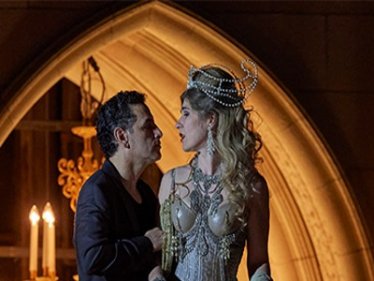Faust - Schedule, Program & Tickets
Faust
musical direction
Bertrand de Billy
Staging
Frank Castorf
stage
Aleksandar Denic
Costumes
Adriana Braga Peretzki
light
Lothar Baumgarte
Assistant director
Wolfgang Gruber
Video director
Martin Andersson
Camera / image creation
Tobias shower
Daniel Keller
dramaturgy
Ann-Christine Mecke
Doctor Faust
Stephen Costello
Marguerite
Rachel Willis-Sorensen
Méphistophélès
Adam Palka
Valentine
Étienne Dupuis
Siébel
Margaret Plummer
The tenor aria "Salut, demeure chaste et pure" ("Greetings to me, chaste and pure dwelling") is exemplary of Charles Gounod's handling of Johann Wolfgang von Goethe's tragedy: on the one hand the text is almost literally based on the original, on the other hand it adds So much languishing feeling is added to the music that for some guardians of the grail of German culture of sensual refinement it became too much: while Faust sings about the "innocent and divine soul" of the absent Marguerite, the solo violin hugs his melody like a duet partner. And "the melody is delightful," even the Gounod skeptic Hector Berlioz said in his premiere review: "There was applause, but not enough, the aria deserved a hundredfold applause."
Admittedly, other French arrangements of Faust from the 19th century would have given the German keepers of the Grail even more cause for annoyance: In numerous crude and comical scenes, they sent Faust and Mephisto not only to the Harz Mountains, but also to Vesuvius or even India. Gounod's opera, which premiered in Paris in 1859, sticks relatively closely to Goethe's original, but dispenses with many figures and scenes and sets his own priorities: the old Faust is less tormented by the question of "what holds the world together at its core" than by the longing for love and Youth. Méphistophélès, less intellectual »principle of negation« than devilishly attractive magician, draws his attention to Marguerite - and Faust is enthusiastic. A deal is quickly made: the devil serves Faust on earth, after Faust's death it should be the other way around. Marguerite, too, does not remain unimpressed by what Méphistophélès has to offer: material luxury and sensual pleasure, often musically illustrated by Gounod with a waltz. But the relationship between Faust and Marguerite remains an episode, because Faust is drawn to new attractions, while Marguerite initially remains pregnant, only to then experience how her faithless lover kills her brother ...
Subject to changes.
Bertrand de Billy
Staging
Frank Castorf
stage
Aleksandar Denic
Costumes
Adriana Braga Peretzki
light
Lothar Baumgarte
Assistant director
Wolfgang Gruber
Video director
Martin Andersson
Camera / image creation
Tobias shower
Daniel Keller
dramaturgy
Ann-Christine Mecke
Doctor Faust
Stephen Costello
Marguerite
Rachel Willis-Sorensen
Méphistophélès
Adam Palka
Valentine
Étienne Dupuis
Siébel
Margaret Plummer
The tenor aria "Salut, demeure chaste et pure" ("Greetings to me, chaste and pure dwelling") is exemplary of Charles Gounod's handling of Johann Wolfgang von Goethe's tragedy: on the one hand the text is almost literally based on the original, on the other hand it adds So much languishing feeling is added to the music that for some guardians of the grail of German culture of sensual refinement it became too much: while Faust sings about the "innocent and divine soul" of the absent Marguerite, the solo violin hugs his melody like a duet partner. And "the melody is delightful," even the Gounod skeptic Hector Berlioz said in his premiere review: "There was applause, but not enough, the aria deserved a hundredfold applause."
Admittedly, other French arrangements of Faust from the 19th century would have given the German keepers of the Grail even more cause for annoyance: In numerous crude and comical scenes, they sent Faust and Mephisto not only to the Harz Mountains, but also to Vesuvius or even India. Gounod's opera, which premiered in Paris in 1859, sticks relatively closely to Goethe's original, but dispenses with many figures and scenes and sets his own priorities: the old Faust is less tormented by the question of "what holds the world together at its core" than by the longing for love and Youth. Méphistophélès, less intellectual »principle of negation« than devilishly attractive magician, draws his attention to Marguerite - and Faust is enthusiastic. A deal is quickly made: the devil serves Faust on earth, after Faust's death it should be the other way around. Marguerite, too, does not remain unimpressed by what Méphistophélès has to offer: material luxury and sensual pleasure, often musically illustrated by Gounod with a waltz. But the relationship between Faust and Marguerite remains an episode, because Faust is drawn to new attractions, while Marguerite initially remains pregnant, only to then experience how her faithless lover kills her brother ...
Subject to changes.
There are no products matching the selection.



